新目标七年级英语下册Unit2复习
- 格式:ppt
- 大小:6.91 MB
- 文档页数:100
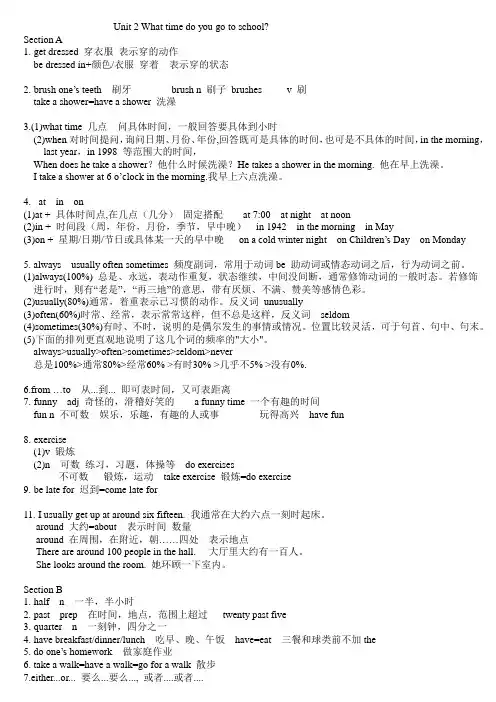
Unit 2 What time do you go to school?Section A1.get dressed 穿衣服表示穿的动作be dressed in+颜色/衣服穿着表示穿的状态2.brush one’s teeth 刷牙brush n 刷子brushes v 刷take a shower=have a shower 洗澡3.(1)what time 几点问具体时间,一般回答要具体到小时(2)when对时间提问,询问日期、月份、年份,回答既可是具体的时间,也可是不具体的时间,in the morning,last year,in 1998 等范围大的时间,When does he take a shower?他什么时候洗澡?He takes a shower in the morning. 他在早上洗澡。
I take a shower at 6 o’clock in the morning.我早上六点洗澡。
4.at in on(1)at + 具体时间点,在几点(几分)固定搭配at 7:00 at night at noon(2)in + 时间段(周,年份,月份,季节,早中晚)in 1942 in the morning in May(3)on + 星期/日期/节日或具体某一天的早中晚on a cold winter night on Children’s Day on Monday5. always usually often sometimes 频度副词,常用于动词be 助动词或情态动词之后,行为动词之前。
(1)always(100%) 总是、永远,表动作重复,状态继续,中间没间断,通常修饰动词的一般时态。
若修饰进行时,则有“老是”,“再三地”的意思,带有厌烦、不满、赞美等感情色彩。
(2)usually(80%)通常,着重表示已习惯的动作。
反义词unusually(3)often(60%)时常、经常,表示常常这样,但不总是这样,反义词seldom(4)sometimes(30%)有时、不时,说明的是偶尔发生的事情或情况。
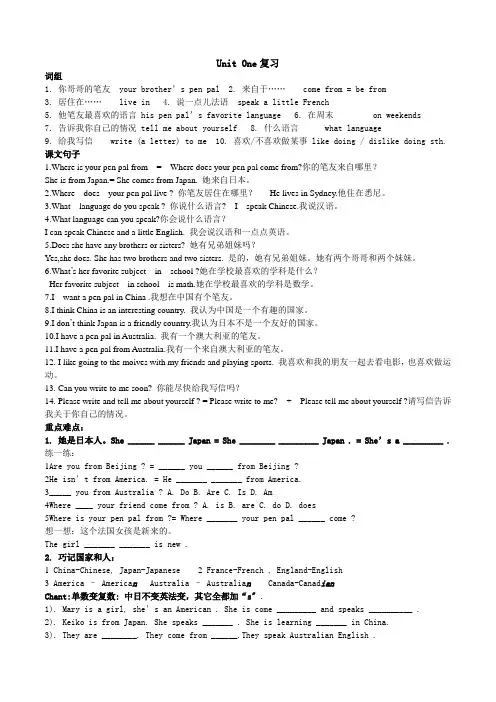
Unit One复习词组1. 你哥哥的笔友 your brother’s pen pal2. 来自于…… come from = be from3. 居住在…… live in4. 说一点儿法语 speak a little French5. 他笔友最喜欢的语言 his pen pal’s favorite language6. 在周末 on weekends7. 告诉我你自己的情况 tell me about yourself 8. 什么语言 what language9. 给我写信 write (a letter) to me 10. 喜欢/不喜欢做某事 like doing / dislike doing sth. 课文句子1.Where is your pen pal from = Where does your pen pal come from?你的笔友来自哪里?She is from Japan.= She comes from Japan. 她来自日本。
2.Where does your pen pal live ? 你笔友居住在哪里?He lives in Sydney.他住在悉尼。
3.What language do you speak ? 你说什么语言? I speak Chinese.我说汉语。
4.What language can you speak?你会说什么语言?I can speak Chinese and a little English. 我会说汉语和一点点英语。
5.Does she have any brothers or sisters? 她有兄弟姐妹吗?Yes,she does. She has two brothers and two sisters. 是的,她有兄弟姐妹。
她有两个哥哥和两个妹妹。
6.What’s her favorite subject in school ?她在学校最喜欢的学科是什么?Her favorite subject in school is math.她在学校最喜欢的学科是数学。
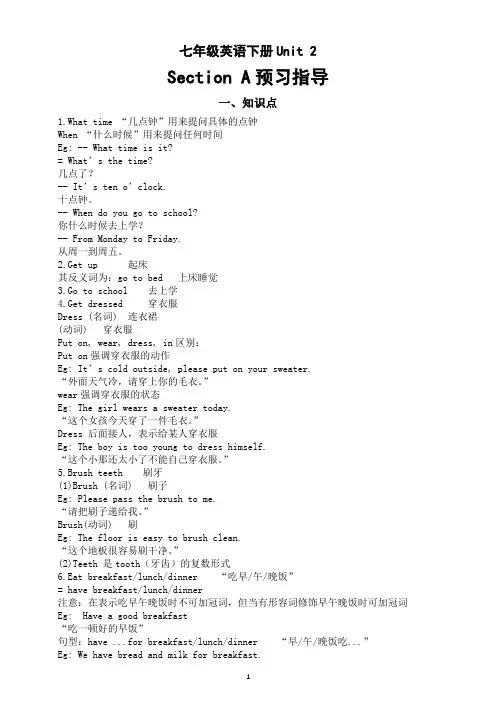
七年级英语下册Unit 2Section A预习指导一、知识点1.What time “几点钟”用来提问具体的点钟When “什么时候”用来提问任何时间Eg: -- What time is it?= What’s the time?几点了?-- It’s ten o’clock.十点钟。
-- When do you go to school?你什么时候去上学?-- From Monday to Friday.从周一到周五。
2.Get up 起床其反义词为:go to bed 上床睡觉3.Go to school 去上学4.Get dressed 穿衣服Dress (名词) 连衣裙(动词) 穿衣服Put on, wear, dress, in区别:Put on强调穿衣服的动作Eg: It’s cold outside, please put on your sweater.“外面天气冷,请穿上你的毛衣。
”wear强调穿衣服的状态Eg: The girl wears a sweater today.“这个女孩今天穿了一件毛衣。
”Dress 后面接人,表示给某人穿衣服Eg: The boy is too young to dress himself.“这个小那还太小了不能自己穿衣服。
”5.Brush teeth 刷牙(1)Brush (名词) 刷子Eg: Please pass the brush to me.“请把刷子递给我。
”Brush(动词) 刷Eg: The floor is easy to brush clean.“这个地板很容易刷干净。
”(2)Teeth 是tooth(牙齿)的复数形式6.Eat breakfast/lunch/dinner “吃早/午/晚饭”= have breakfast/lunch/dinner注意:在表示吃早午晚饭时不可加冠词,但当有形容词修饰早午晚饭时可加冠词Eg: Have a good breakfast“吃一顿好的早饭”句型:have ...for breakfast/lunch/dinner “早/午/晚饭吃...”Eg: We have bread and milk for breakfast.“我们早饭吃面包和牛奶。
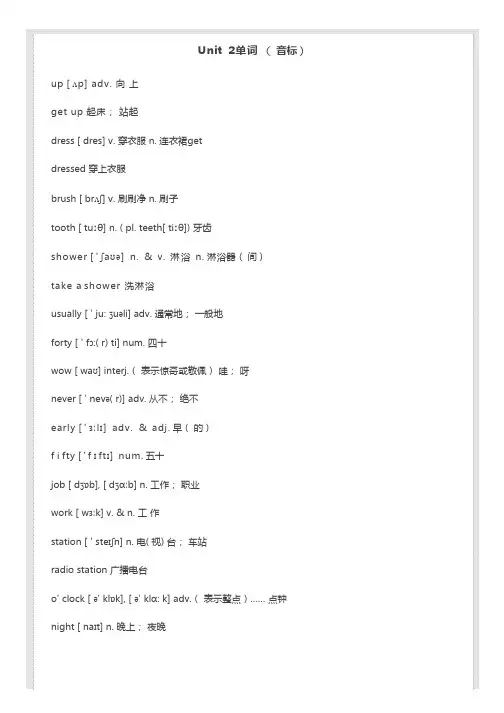
Unit 2单词(音标)up [ ʌp] adv. 向上get up 起床;站起dress [ dres] v. 穿衣服 n. 连衣裙getdressed 穿上衣服brush [ brʌʃ] v. 刷刷净 n. 刷子tooth [ tuːθ] n. ( pl. teeth[ tiːθ]) 牙齿shower [ ' ʃaʊə]n.& v.淋浴n. 淋浴器(间)take a shower 洗淋浴usually [ ' ju: ʒuəli] adv. 通常地;一般地forty [ ' fɔ:( r) ti] num. 四十wow [ waʊ] interj.(表示惊奇或敬佩)哇;呀never [ ' nevə( r)] adv. 从不;绝不early [ ' ɜːlɪ]adv.& adj. 早(的)f i fty [ ' f ɪ ftɪ]num. 五十job [ dʒɒb], [ dʒɑːb] n. 工作;职业work [ wɜːk] v. & n. 工作station [ ' steɪʃn] n. 电( 视) 台;车站radio station 广播电台o' clock [ ə' klɒk], [ ə' klɑ: k] adv.(表示整点)…… 点钟night [ naɪt] n. 晚上;夜晚funny [ ' fʌnɪ] adj. 奇怪的;滑稽好笑的exercise [ ' eksəsaɪz]v.& n. 锻炼;练习on weekends ( 在) 周末best [ best] adj. 最好的 adv. 最好地;最group [ gruːp] n. 组;群half [ hɑːf], [ hæf] n. & pron. 一半;半数past [ pɑːst],[ pæst]prep. 晚于;过(时间) adj. 过去的quarter [ ' kwɔː( r) tə( r)]n. 一刻钟;四分之一homework[' həʊmwɜː( r) k] n. 家庭作业do( one’ s) homework 做作业run [ rʌn] v. 跑;奔clean [ kliːn]v. 打扫;弄干净 adj. 干净的walk [ wɔːk]n.& v. 行走;步行take a walk 散步;走一走quickly [ ' kwɪkli] adv. 很快地either [ ' aɪðə( r)], [ ' iː ðə( r) ] adv. 或者;也(用在否定词组后)either… or…要么……要么……;或者……或者……lot [ lɒt], [ lɑ: t] pron. 大量;许多lots of 大量;许多sometimes [ ' sʌmtaɪmz] adv. 有时taste [ teɪst]v. 有……的味道;品尝 n. 味道;滋味li fe [ laɪf]n. 生活;生命Rick [ rɪk] 里克(男名)Jim [ dʒɪm] 吉姆(男名)Scott [ skɒt], [ skɑ: t] 斯科特(男名)Tony [ ' təʊnɪ] 托尼(男名)unit2电子课本Liaten and match the timea with the actions. Draw lines from the clocksto the pictures.Snident A ie the interviewer. Student B is Rick. Ask amd axxswerquestions about Rick's day.A: V 'ha c t tim dci yo u usually take a s lioive r, Rick * B : 1 us my take a sh never aI s ix fo rty.Match theactivi£ics wiEts tJze pictures.1. ,lot up c?. gn tn sChnnlri t si x i hi r r yWhos tiry›c dg ypuusmlly get up7Jim hassisters. Jim’s familyhas _ xhuxvcr.Ltccers agaJxs. Cossp!ete tbe shower schedcsle £orJiza*c fiuoJ3y'.Tims5:3¢linterviewer: -$cott has an inrcrext ing jrib. He wcirks at a radiri station.Scott, what time is your radio show?Ston: Interviewer: Scott:From bvelve o’clock at night to six oklock in the morning. What time do you usually get up?At eight thirty at night. ”thenI eat breakfast at nine.Interviewer: ‘Heat s a ftnftf¥y titTte fOr t›renkfast!S‹ort:Scoti:Yeah. After that, I usually exercise at a1›nut ten twenty. then do you go to «'ork?At 4•levcn t3’clock, .*cl I 'mnever late for work.tøte on •<cłændsüh< țjr î3 uc u14.Anna never eats breakfast.S. What rime does your be3t Friend go to sckooł7When do students usually do these things? h4atchthe activitie.s tenth the time of day..i .jiiartcr i‹› ten ii* ila.Check your answers with your partner.sListen rind circle the activities yuu hear.g= =p 5: 30.1. eat \ realm:1st 4. ¿u tu choul. in hnmc7. clcan i riy rel t3It1G. eat ‹4in n er9. t.Ake a is' all 1 O. t;ci ter b c dListen agatn. Wrtte Mtc titres text to tbe actioicies yotz circled In 1 c.AkandanswerquesConsaboutlom. ’Unit2 知识梳理◆短语归纳1.what time 几点2.go to school 去上学3.get up 起床4.take a shower 洗淋浴5.brush teeth 刷牙6.get to 到达7.do homework 做家庭作业8.go to work 去上班9.go home 回家10.eat breakfast 吃早饭11.get dressed 穿上衣服12.get home 到家13.either…or…要么…要么…14.go to bed 上床睡觉15.in the morning/afternoon/evening 在上午/下午/晚上16.take a walk 散步17.lots of=a lot of 许多,大量18.radio station 广播电台19.at night 在晚上20.be late for=arrive late for 迟到◆用法集萃1.at + 具体时间点在几点(几分)2.eat breakfast/lunch/dinner 吃早饭/午饭/晚饭3.thirty/half past +基数词…点半4.fifteen/a quarter to +基数词差一刻到…点5.take a/an+名词从事…活动6.from…to…从…到…7.need to do sth 需要做某事◆典句必背1.—What time do you usually get up? 你通常几点钟起床?—I usually get up at six thirty. 我通常6:30起床。
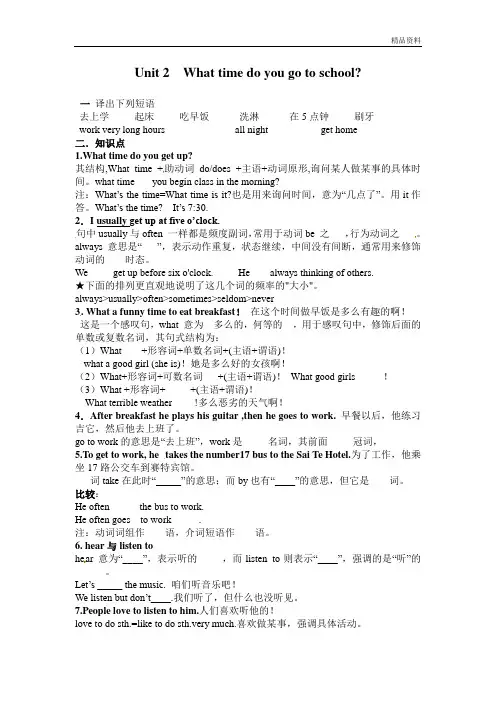
Unit 2 What time do you go to school?一译出下列短语去上学_____起床_____吃早饭______洗淋______在5点钟_____刷牙______ work very long hours______________all night ________ get home_________ 二.知识点1.What time do you get up?其结构,What time +助动词do/does +主语+动词原形,询问某人做某事的具体时间。
what time ___you begin class in the morning?注:What’s the time=What time is it?也是用来询问时间,意为“几点了”。
用it作答。
What’s the time? It’s 7:30.2.I usually get up at five o’clock.句中usually与often 一样都是频度副词,常用于动词be 之___,行为动词之___。
always 意思是“___”,表示动作重复,状态继续,中间没有间断,通常用来修饰动词的____时态。
We ____ get up before six o'clock. He ___ always thinking of others.★下面的排列更直观地说明了这几个词的频率的"大小"。
always>usually>often>sometimes>seldom>never3. What a funny time to eat breakfast!在这个时间做早饭是多么有趣的啊!这是一个感叹句,what 意为多么的,何等的,用于感叹句中,修饰后面的单数或复数名词,其句式结构为:(1)What____+形容词+单数名词+(主语+谓语)!what a good girl (she is)!她是多么好的女孩啊!(2)What+形容词+可数名词___+(主语+谓语)!What good girls _____!(3)What +形容词+_____+(主语+谓语)!What terrible weather ____!多么恶劣的天气啊!4.After breakfast he plays his guitar ,then he goes to work. 早餐以后,他练习吉它,然后他去上班了。

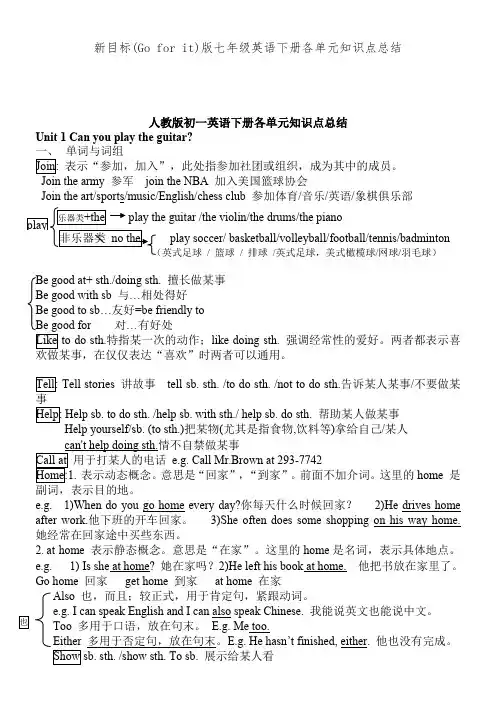
新目标(Go for it)版七年级英语下册各单元知识点总结人教版初一英语下册各单元知识点总结Unit 1 Can you play the guitar?一、 单词与词组表示“参加,加入”,此处指参加社团或组织,成为其中的成员。
Join the army 参军 join the NBA 加入美国篮球协会Join the art/sports/music/English/chess club 参加体育/音乐/英语/象棋俱乐部play soccer/ basketball/volleyball/football/tennis/badminton / 篮球 / 排球 /英式足球,美式橄榄球/网球/羽毛球)Be good at+ sth./doing sth. 擅长做某事Be good with sb 与…相处得好Be good to sb …友好=be friendly toBe good for 对…有好处特指某一次的动作;like doing sth. 强调经常性的爱好。
两者都表示喜讲故事 tell sb. sth. /to do sth. /not to do sth.告诉某人某事/不要做某帮助某人做某事Help yourself/sb. (to sth.)把某物(尤其是指食物,饮料等)拿给自己/某人e.g. Call Mr.Brown at 293-7742意思是“回家”,“到家”。
前面不加介词。
这里的home 是e.g. 1)When do you go home every day?你每天什么时候回家? 2)He drives home after work.他下班的开车回家。
3)She often does some shopping on his way home. 她经常在回家途中买些东西。
2. at home 表示静态概念。
意思是“在家”。
这里的home 是名词,表示具体地点。
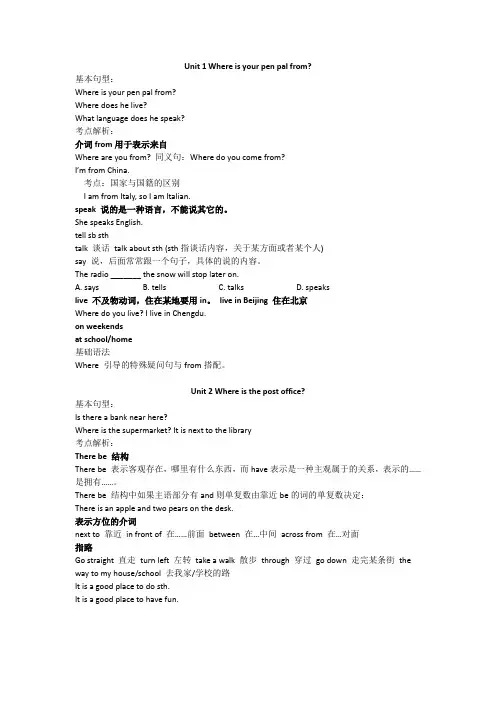
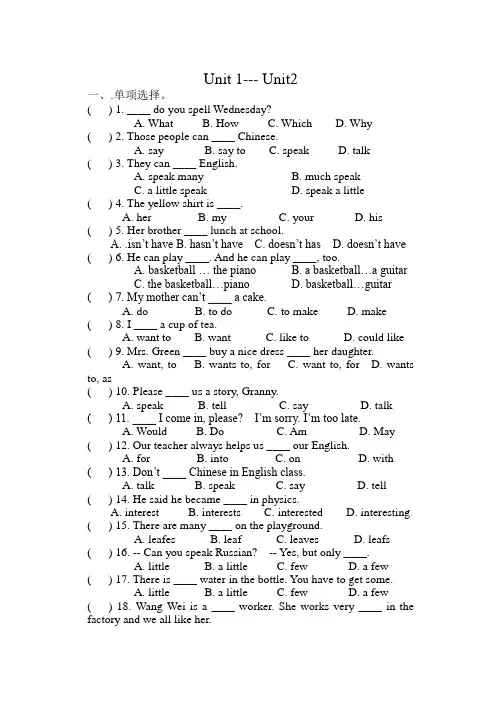
Unit 1--- Unit2一、.单项选择。
( ) 1. ____ do you spell Wednesday?A. WhatB. HowC. WhichD. Why( ) 2. Those people can ____ Chinese.A. sayB. say toC. speakD. talk( ) 3. They can ____ English.A. speak manyB. much speakC. a little speakD. speak a little( ) 4. The yellow shirt is ____.A. herB. myC. yourD. his ( ) 5. Her brother ____ lunch at school.A. .isn’t haveB. hasn’t haveC. doesn’t hasD. doesn’t have ( ) 6. He can play ____. And he can play ____, too.A. basketball … the pianoB. a basketball…a guitarC. the basketball…pianoD. basketball…guitar ( ) 7. My mother can’t ____ a cake.A. doB. to doC. to makeD. make ( ) 8. I ____ a cup of tea.A. want toB. wantC. like toD. could like ( ) 9. Mrs. Green ____ buy a nice dress ____ her daughter.A. want, toB. wants to, forC. want to, forD. wants to, as( ) 10. Please ____ us a story, Granny.A. speakB. tellC. sayD. talk ( ) 11. ____ I come in, please? I’m sorry. I’m too late.A. WouldB. DoC. AmD. May ( ) 12. Our teacher always helps us ____ our English.A. forB. intoC. onD. with ( ) 13. Don’t ____ Chinese in English class.A. talkB. speakC. sayD. tell ( ) 14. He said he became ____ in physics.A. interestB. interestsC. interestedD. interesting ( ) 15. There are many ____ on the playground.A. leafesB. leafC. leavesD. leafs ( ) 16. -- Can you speak Russian?-- Yes, but only ____.A. littleB. a littleC. fewD. a few ( ) 17. There is ____ water in the bottle. You have to get some.A. littleB. a littleC. fewD. a few ( ) 18. Wang Wei is a ____ worker. She works very ____ in the factory and we all like her.A. well, wellB. good, goodC. good, wellD. well, good( ) 19. My grandpa doesn’t want ____ at home. He wants ____ out for a walk on Sunday.A. to stay, goB. stay, goC. stay, to goD. to stay, to go ( ) 20. She can’t ____ the difference between the two cars.A. sayB. talkC. speakD. tell二、连词成句。
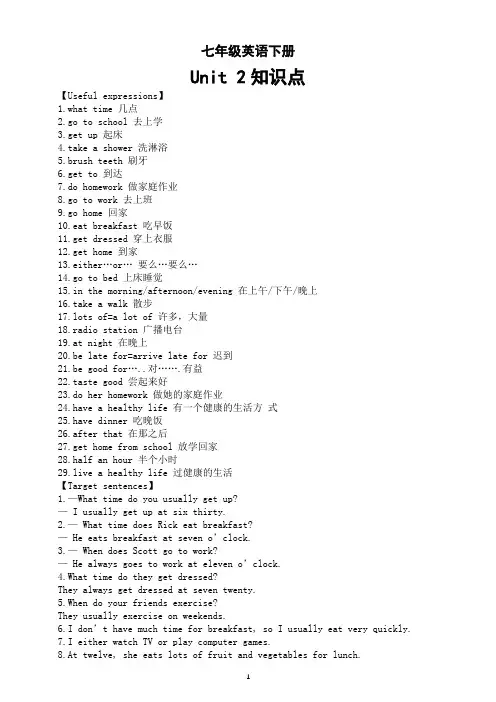
七年级英语下册Unit 2知识点【Useful expressions】1.what time 几点2.go to school 去上学3.get up 起床4.take a shower 洗淋浴5.brush teeth 刷牙6.get to 到达7.do homework 做家庭作业8.go to work 去上班9.go home 回家10.eat breakfast 吃早饭11.get dressed 穿上衣服12.get home 到家13.either…or…要么…要么…14.go to bed 上床睡觉15.in the morning/afternoon/evening 在上午/下午/晚上16.take a walk 散步17.lots of=a lot of 许多,大量18.radio station 广播电台19.at night 在晚上20.be late for=arrive late for 迟到21.be good for…..对…….有益22.taste good 尝起来好23.do her homework 做她的家庭作业24.have a healthy life 有一个健康的生活方式25.have dinner 吃晚饭26.after that 在那之后27.get home from school 放学回家28.half an hour 半个小时29.live a healthy life 过健康的生活【Target sentences】1.—What time do you usually get up?— I usually get up at six thirty.2.— What time does Rick eat breakfast?—He eats breakfast at seven o’clock.3.— When does Scott go to work?—He always goes to work at eleven o’clock.4.What time do they get dressed?They always get dressed at seven twenty.5.When do your friends exercise?They usually exercise on weekends.6.I don’t have much time for breakfast, so I usually eat very quickly.7.I either watch TV or play computer games.8.At twelve, she eats lots of fruit and vegetables for lunch.9.She knows it’s not good for her, but it tastes good!10.After school, I sometimes play basketball for half an hour.【Language points】1.get dressedget dressed 穿上衣服【用法详解】get dressed为固定短语,表示穿的动作。
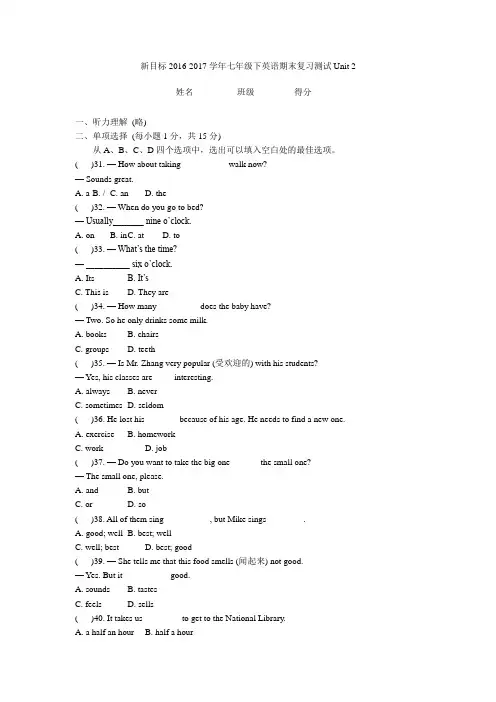
新目标2016-2017学年七年级下英语期末复习测试Unit 2姓名________ 班级________ 得分________一、听力理解(略)二、单项选择(每小题1分,共15分)从A、B、C、D四个选项中,选出可以填入空白处的最佳选项。
( )31. — How about taking __________ walk now?— Sounds great.A. aB. /C. anD. the( )32. — When do you go to bed?—Usually_______ nine o’clock.A. onB. inC. atD. to( )33. —What’s the time?—__________ six o’clock.A. ItsB. It’sC. This isD. They are( )34. — How many _________ does the baby have?— Two. So he only drinks some milk.A. booksB. chairsC. groupsD. teeth( )35. — Is Mr. Zhang very popular (受欢迎的) with his students?— Yes, his classes are ____ interesting.A. alwaysB. neverC. sometimesD. seldom( )36. He lost his _______ because of his age. He needs to find a new one. A. exercise B. homeworkC. workD. job( )37. — Do you want to take the big one ______ the small one?— The small one, please.A. andB. butC. orD. so( )38. All of them sing __________, but Mike sings ________.A. good; wellB. best; wellC. well; bestD. best; good( )39. — She tells me that this food smells (闻起来) not good.— Yes. But it __________ good.A. soundsB. tastesC. feelsD. sells( )40. It takes us ________ to get to the National Library.A. a half an hourB. half a hourC. an hour halfD. half an hour( )41. My grandfather lives in Miami for most of his __________.A. lifeB. familyC. ageD. years( )42. We know that 8:15 reads _________ in English.A. eight past a quarterB. eight to a quarterC. a quarter past eightD. a quarter to eight( )43. — Wow! Your room is so tidy.— Thanks. I _______ it every morning.A. brushB. cleanC. runD. teach( )44. A group of girls ________ in that bread store.A. amB. isC. areD. be( )45. — ___________?—At eight o’clock.A. Where do you like to do exerciseB. Why are you hereC. When is the Sports DayD. What time do you watch TV三、完形填空(每小题1分,共10分)阅读下面材料,从A、B、C、D四个选项中,选出最佳选项。
《新目标英语》七年级下册重点句型、短语归纳Unit 1 Where’s your pen pal from?Ⅰ、Useful expressions:1. be from= come from 来自于2. New York 纽约3. the United States 美国4. he United Kingdom 英国5. one’s (new) pen pal 某人的(新)笔友6. in Paris 在巴黎7. want a pen pal 想要一个笔友8. a pen pal in China=a Chinese pen pal 一个在中国的笔友9. a very interesting country 一个非常有趣的国家10. in November 在十一月11.speak a little (French) 说一点儿法语12. like doing sth. 喜欢做某事13. go to the movies 去看电影14. in school / at school在学校里15. too difficult 太困难16. write to sb. (soon) = write a letter to sb (soon)(尽快)给某人写信17. pen pal wanted 征招笔友18. on weekends 在周末19. at school 在学校;在上学20. the long weekend 漫长的周末21. tell sb. about yourself 告述某人关于你自己的情况22.live in 居住在---23 .write to sb给某人写信;写信给某人24.in the world 在世界上25、in China 在中国26、one’s favorite subject 某人最喜欢的科目27.speak English 讲英语28、likes and dislikes 爱憎,好恶29、play sports 做运动Ⅱ、Sentences:1. Where is your pen pal from? 你的笔友来自哪儿?=Where does your pen pal come from?She’s from Japan. 她来自日本。
新目标七年级下Unit 2 知识点归纳与复习单元知识清单一、重点单词:1. libr r 图书馆2. rest rant 餐馆3. superm ket 超市4. str t 街道5. p k 公园6. c nt 中心7. br ge 桥8. n 在……附近9. acr 横过10. n xt 贴近11. betw n 在两者之间12. fr nt 前面13. t n 转弯14. l ft 左边15. r t 右边16. cl n 清洁的17. qu t 宁静的18. d ty 肮脏的19. h se 房子20. welc m 欢迎21. g den 花园22. enj 欣赏23. w k 散步24. thr 穿过25. begin 开始26. t 旅行27. v s t 参观28. pl ce 地方29. h gry 饥饿的30. a ive 到达31. w 路线32. t ke 乘, 坐33. t x 出租车34. airp t 飞机场35. p ss 通过36. h pe 希望二、必会短语1. post 邮局2. phone 投币式公用电话3. in of 在……前面4. on 在右边5. take 散步6. fun 玩得开心7. turn 向左转8. across 在……对面9. take 坐出租车10. have a 旅途愉快三、应知语法和句式:1. 表示在某地有某物用there be。
如:在这附近有一家银行。
a bank near here.2. There de 的一般问句是将be放到there的前面。
如:有一个超市吗?a supermarket?肯定回答是:Y es, .否定回答是:No, .3. 本课学习的两种问路方式:一种是:用Is there …? 如:在这附近有公用电话吗?a pay phone near here?另一种是:用Where is the …? 如:图书馆在哪?the library?4. welcome to …表示欢迎到某地。
Unit2 Where's the post office ?单元复习(一)一.复习目标1、掌握方位介词及词组: on, near, between, next to, across from, in front of,behind。
2、掌握“where”开头的特殊疑问句。
3、掌握问路和指路的常用语。
二.自主复习本单元通过谈论邻近地区各部方位的话题,学习问路、指路的表达方式及有关方位介词的用法。
学习时请注意两点:1)根据上下文理解方位介词的含义,并掌握其用法。
2)在理解课文的基础上,同学们互换有关生活、学习等区域的信息,进行实际交流,提高语言的运用能力。
三.复习检测一.词汇 A.请根据句意及所给汉语提示填写单词1. The hospital is on your (左边).2. Is there a bank in the (附近)3. (转动) right and then go down the street.4. The boys come here for (娱乐)5. Lily, are you (饥饿)?B.用合适的音讯填空1. Is there a (公园) near your school?2. Look! There is a (银行) over there.3. Where is the pay (公用电话)?4. The hotel is next to the (超市).5. Do you know the way to the (邮局)?C. 写出下列单词的反义词1.small2. left3. old4. busy5. dirty 二.单项选择( )1. The teacher sits the two students.A. betweenB. inC. onD. over( )2. Jack, there is for you.A. callingB. callsC. callD. a call( )3. I know that you will Beijing next Sunday.A. arriveB. arrive atC. arrive inD. go( )4. Mary, I say it just .A. to funB. funC. for funD. of fun( )5. This is my first the USAA. visitB. visit toC. visitingD. visitingto( )6. . Where is the men’s room?A. SorryB. Excuse meC. Old manD. Mr.( )7. – When is your mother arriving?-- .A. In next TuesdayB. On next TuesdayC. With next TuesdayD. Next Tuesday( )8. Next to the school a small supermarket.A. areB. isC. amD. be( )9. Let me you the storyA. sayB. talkC. tellD. speak( )10. When you see your teacher, hello to him.A. and sayB. to sayC. sayD. saying三.完成下列句子,每空一词1. 那是一个带有花园的房子吗?that a house a garden?2. 图书馆在邮局的对面The is from the post office.3. 我们轮流读课文.We turns to the text.4. 让小明做这件事情吧.Xiao Ming it.5. 你是位受欢迎的老人.You a old man.6. 吉姆经常在公园开心的玩耍。
Unit2 What time do you go to school?七下unit2单词.mp300:0003:49七下unit2 section A.mp300:0003:12七下unit2 section B.mp300:0003:39点击上方绿标即可收听音频◆◆◆Unit 2单词(音标)up [ʌp] adv. 向上get up 起床;站起dress [dres] v.穿衣服n.连衣裙get dressed 穿上衣服brush [brʌʃ] v.刷刷净n.刷子tooth [tuːθ] n. (pl. teeth[tiːθ])牙齿shower ['ʃaʊə] n. & v. 淋浴n.淋浴器(间)take a shower 洗淋浴usually ['ju:ʒuəli] adv.通常地;一般地forty ['fɔ:(r)ti] num.四十wow [waʊ] interj.(表示惊奇或敬佩)哇;呀never ['nevə(r)] adv.从不;绝不early ['ɜːlɪ] adv. & adj.早(的)fifty ['fɪftɪ] num.五十job [dʒɒb], [dʒɑːb] n.工作;职业work [wɜːk] v. & n. 工作station ['steɪʃn] n.电(视)台;车站radio station 广播电台o'clock [ə'klɒk], [ə'klɑ:k] adv.(表示整点)……点钟night [naɪt] n. 晚上;夜晚funny ['fʌnɪ] adj.奇怪的;滑稽好笑的exercise ['eksəsaɪz] v. & n. 锻炼;练习on weekends (在)周末best [best] adj.最好的adv.最好地;最group [gruːp] n.组;群half [hɑːf], [hæf] n. & pron. 一半;半数past [pɑːst],[pæst] prep.晚于;过(时间)adj.过去的quarter ['kwɔː(r)tə(r)] n.一刻钟;四分之一homework['həʊmwɜː(r)k] n. 家庭作业do (one’s) homework 做作业run [rʌn] v. 跑;奔clean [kliːn] v.打扫;弄干净adj.干净的walk [wɔːk] n. & v. 行走;步行take a walk 散步;走一走quickly ['kwɪkli] adv. 很快地either ['aɪðə(r)], [ 'iːðə(r) ]adv.或者;也(用在否定词组后)either…or…要么……要么……;或者……或者……lot [lɒt], [lɑ:t] pron.大量;许多lots of 大量;许多sometimes ['sʌmtaɪmz] adv.有时taste [teɪst] v.有……的味道;品尝n.味道;滋味life [laɪf] n.生活;生命Rick [rɪk] 里克(男名)Jim [dʒɪm] 吉姆(男名)Scott [skɒt], [skɑ:t] 斯科特(男名)Tony ['təʊnɪ] 托尼(男名)unit2电子课本Unit2 知识梳理◆短语归纳1. what time 几点2. go to school 去上学3. get up 起床4. take a shower 洗淋浴5. brush teeth 刷牙6. get to 到达7. do homework 做家庭作业8. go to work 去上班9. go home 回家10. eat breakfast 吃早饭11. get dressed 穿上衣服12. get home 到家13. either…or…要么…要么…14. go to bed 上床睡觉15. in the morning/afternoon/evening 在上午/下午/晚上16. take a walk 散步17. lots of=a lot of 许多,大量18. radio station 广播电台19. at night 在晚上20. be late for=arrive late for 迟到◆用法集萃1. at + 具体时间点在几点(几分)2. eat breakfast/lunch/dinner 吃早饭/午饭/晚饭3. thirty/half past +基数词…点半4. fifteen/a quarter to +基数词差一刻到…点5. take a/an+名词从事…活动6. from…to…从…到…7. need to do sth 需要做某事◆典句必背1. —What time do you usually get up? 你通常几点钟起床?—I usually get up at six thirty. 我通常6:30起床。
七年级英语下册Unit2默写练习班级考号姓名总分一、默写下列词汇或汉语意思。
(一)识记类词汇[名词]1.工作;职业2.晚上;夜晚3.组;群4.一刻钟;四分之一5./laɪf/[动词]跑;奔[数词]1.四十2./'fɪftɪ/[副词]1. usually2. 从不;绝不3.(表示整点)……点钟4./'sʌmtaɪmz/[感叹词]wow[兼类词]1.刷;刷净 v.刷子n.2.早(的) adv.&.adj.3. 工作v.&.n.4./'eksəsaɪz/ v.&.n.5.最好的 adj.最好地;最adv.6.一半;半数n.&.pron.7.打扫;弄干净v.干净的adj.8.晚于;过(时间) prep.过去的adj.9.有……的味道;品尝v.味道;滋味n.(二)拓展类词汇1.向上adv. →起床;站起(短语)2.穿衣服 v. 连衣裙n. →穿上衣服(短语)3.牙齿n. →(复数) →刷牙(短语)4.淋浴n.&.v.淋浴器(间)n. →洗淋浴(短语)5.电(视)台;车站n. →广播电台(短语)6.奇怪的;滑稽好笑的adj. →乐趣;快乐n.7.家庭作业n. →做作业(短语)8.行走;步行n.&.v. →散步;走一走(短语)9.很快地adv. →快的 adj.10.或者conj.也(用在否定词组后)adv.→要么……要么……;或者……或者.…(短语)11.大量;许多 pron. →大量;许多(短语)二、默写下列短语。
1.去上学2.吃早饭3.在六点半4.电台节目5.从...…到……6.在那之后7.……迟到_8.去上班9.在周末/上学日10.你最好的朋友11.起床晚12.吃晚饭13.在六点四十五分14.回家15.打扫我的房间16.快速地吃17.到家18.对……有好处19.尝起来好吃三、根据汉语提示完成下列句子。
1.“你通常什么时候洗淋浴,里克?”“我通常六点四十洗淋浴。